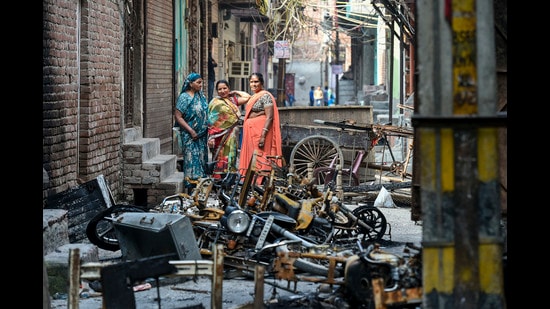Let’s not normalise hate speeches, mob violence
The Haridwar hate-mongering is not just vile; it is a national security issue. It goes to the very heart of the people we are and the people we want to be
When I saw the horrific hate clips from Haridwar, my first instinct was to “not platform them”. There’s always the worry that by talking about something and giving it air time, even if it is to condemn it, you are amplifying its message.

My initial instinct was wrong.
We live in an age where a stand-up comic was sent to jail for a joke he did not crack at the performance he was arrested from — I am speaking of Munawar Faruqui — and in staggering contrast, men who openly call for armed violence against Muslims were able to host what appeared to be a conclave of hate without any interruption.
For anyone who has missed it, speeches at Haridwar’s “Dharam Sansad” invoked Nathuram Godse, called for genocide against India’s Muslims, and held up Myanmar as an example to emulate.
Among those who attended it and called for a “Bhagwa constitution” was Ashwini Upadhyaya, a lawyer and former spokesperson of the Bharatiya Janata Party (BJP) in Delhi, who was arrested on hate speech charges for an event at the Capital’s Jantar Mantar.
What we may have once dismissed as the bigoted rantings of WhatsApp uncles in our housing society online groups has today spilled over into the open. What we once thought was the “fringe” and thus not worth engaging with, is today the mainstream; those who find them abhorrent are possibly the fringe. What we once thought was impossible to say out loud, even if you were coarse enough to think it, is not just said, its defended with whataboutery counter-arguments.
There was a matter of fact boast about how Manmohan Singh, former prime minister, should have been killed the day he argued that minorities should have first claim on India’s resources. “If I had been present, I would have done a Nathuram,” Dharam Das, a speaker who invoked Mahatama Gandhi’s assassin, was seen on video saying.
Prabhodanand Giri, who called for a “safai abhiyan” (cleanliness drive) in reference to the ethnic cleansing of Indian Muslims has been photographed with some key BJP leaders. A photograph circulating online appears to show the chief minister of Uttarakhand, Pushkar Dhami, touching his feet.
The event went on for three days with requisite police permission. Again, contrast this to cities across India where the police have actively discouraged satirical performances for fear of a law and order problem. On Thursday, the Uttarakhand Police finally filed a criminal case (under section 153A of the Indian Penal Code) for promoting enmity between different groups on grounds of religion, race, place of birth, residence and language against Jitendra Narayan Tyagi, the former chief of the Uttar Pradesh Shia Waqf board who was earlier known as Waseem Rizvi, and unnamed people.
The normalisation of hate and the legitimacy of the mob is the bitter truth of our time.
Take Punjab, where sacrilege allegations led to two men being beaten to death, including at that most spiritual of religious sites, the Golden Temple. In one of the incidents, at a gurudwara in Kapurthala, it appears that it was an impoverished man, possibly a petty thief, looking for food. But even if it were otherwise, and as heinous as it is to disrespect anyone’s faith, the silence of every single politician in Punjab on the lynchings that followed is indicative of a changing India. The response of the ruling Congress was to talk of stricter punishment for blasphemy.
I have always argued against lazy comparisons between India and Pakistan because I believe that the way power is organised, democracy is imagined, and the State held to account in India, is fundamentally different. But to see the political legitimacy granted to the blasphemy debate in Punjab made me pause.
Are we in danger of losing our essential difference?
It has taken condemnation from two former military chiefs — Admiral Arun Prakash and General Ved Malik — to get Haridwar on to our television prime time. And some television hosts have played their part in fomenting and deepening hatred.
The irony is that at a time when anyone who does not agree with the dominant narrative is called an anti-national, here we have an actual case of harming the idea of the Indian nation.
Because as Brigadier Sandy Thapar, a veteran, pointed out to me, “If this continues, it is only a matter of time before unbridled hatred will infect and stain our military, the one institution that has remained unsullied.”
The Haridwar hate-mongering is not just vile; it is a national security issue.
It goes to the very heart of the people we are and the people we want to be.
If you think this is not your problem; think again.
Barkha Dutt is an award-winning journalist and author
The views expressed are personal
All Access.
One Subscription.
Get 360° coverage—from daily headlines
to 100 year archives.



HT App & Website






